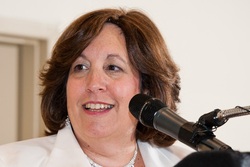
1. Do you think bullying is an issue in informal education?
Unfortunately, bullying is an issue everywhere. Bullying happens most in informal settings and with less adult supervision. It involves social group pressures, and the interactions between individuals. This makes informal settings a prime arena for teasing, harassment and social exclusion. Creating caring peer networks is, of course, possible. It means setting the stage, making it the “in” thing to do, building youth leadership and social responsibility, and challenging callousness or “blindness” to the social well-being of others. I believe most youth want to be leaders not followers, most want to be kind, not cruel, most want to make a difference. Informal education settings and programs provide ideal opportunities to create the environments and give youth the tools grow into socially responsible citizens.
2. Is there anything unique in bullying in the Jewish world?
The Jewish world is a tiny one. Everyone knows everyone else. That means a young person who is socially excluded in one setting (like school) may be equally alone in other settings (camp, shul) because of the overlap of social networks. Also unique, however, is our mesorah, our powerful tradition of caring and inclusion. We have the opportunity to really live the words Kal Yisrael areyvim zeh la zeh and al taamod al dam reyecha.
3. What are you looking forward to most at YouthCon?
I do the bulk of my work in Jewish schools, where no matter how committed educators are to social issues, they have important mandates to cover curriculum as well. I’m excited to meet with engaged informal educators, for many of whom the heart and soul of their work is addressing the social lives of youth.
------------------------------
Rona Novick, PhD is the Director of the Fanya Gottesfeld Heller Doctoral Program at the Azrieli Graduate School of Jewish Education and Administration at Yeshiva University and Clinical Professor of Child Psychology at North Shore Long-Island Jewish Medical Center. Dr. Novick also serves as co-educational director of the Hidden Sparks program, providing consultation to day schools and Yeshivas. Dr. Novick developed the Alliance for School Mental Health at North-Shore Long Island Jewish Medical Center and served as its director for eight years, authoring the BRAVE bully prevention program for schools.
Dr. Novick is a frequent and much sought speaker for both professional and general audiences. Her wit, warmth and engaging style, coupled with extensive knowledge in the fields of psychology, parenting, education and family life have earned her recognition nationally. She is the author of a book for parents: Helping Your Child Make Friends, and editor of the book series Kids Don’t Come With Instruction Manuals. Dr. Novick has made numerous appearances on local and national television and radio.
As the mother of three sons, Dr. Novick credits much of her knowledge and skill to on the job training.
Unfortunately, bullying is an issue everywhere. Bullying happens most in informal settings and with less adult supervision. It involves social group pressures, and the interactions between individuals. This makes informal settings a prime arena for teasing, harassment and social exclusion. Creating caring peer networks is, of course, possible. It means setting the stage, making it the “in” thing to do, building youth leadership and social responsibility, and challenging callousness or “blindness” to the social well-being of others. I believe most youth want to be leaders not followers, most want to be kind, not cruel, most want to make a difference. Informal education settings and programs provide ideal opportunities to create the environments and give youth the tools grow into socially responsible citizens.
2. Is there anything unique in bullying in the Jewish world?
The Jewish world is a tiny one. Everyone knows everyone else. That means a young person who is socially excluded in one setting (like school) may be equally alone in other settings (camp, shul) because of the overlap of social networks. Also unique, however, is our mesorah, our powerful tradition of caring and inclusion. We have the opportunity to really live the words Kal Yisrael areyvim zeh la zeh and al taamod al dam reyecha.
3. What are you looking forward to most at YouthCon?
I do the bulk of my work in Jewish schools, where no matter how committed educators are to social issues, they have important mandates to cover curriculum as well. I’m excited to meet with engaged informal educators, for many of whom the heart and soul of their work is addressing the social lives of youth.
------------------------------
Rona Novick, PhD is the Director of the Fanya Gottesfeld Heller Doctoral Program at the Azrieli Graduate School of Jewish Education and Administration at Yeshiva University and Clinical Professor of Child Psychology at North Shore Long-Island Jewish Medical Center. Dr. Novick also serves as co-educational director of the Hidden Sparks program, providing consultation to day schools and Yeshivas. Dr. Novick developed the Alliance for School Mental Health at North-Shore Long Island Jewish Medical Center and served as its director for eight years, authoring the BRAVE bully prevention program for schools.
Dr. Novick is a frequent and much sought speaker for both professional and general audiences. Her wit, warmth and engaging style, coupled with extensive knowledge in the fields of psychology, parenting, education and family life have earned her recognition nationally. She is the author of a book for parents: Helping Your Child Make Friends, and editor of the book series Kids Don’t Come With Instruction Manuals. Dr. Novick has made numerous appearances on local and national television and radio.
As the mother of three sons, Dr. Novick credits much of her knowledge and skill to on the job training.
 RSS Feed
RSS Feed
